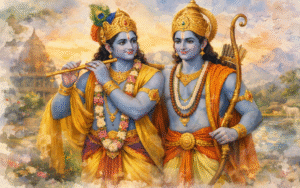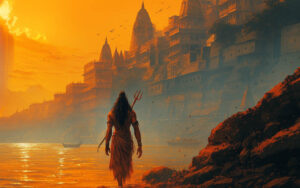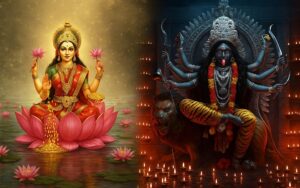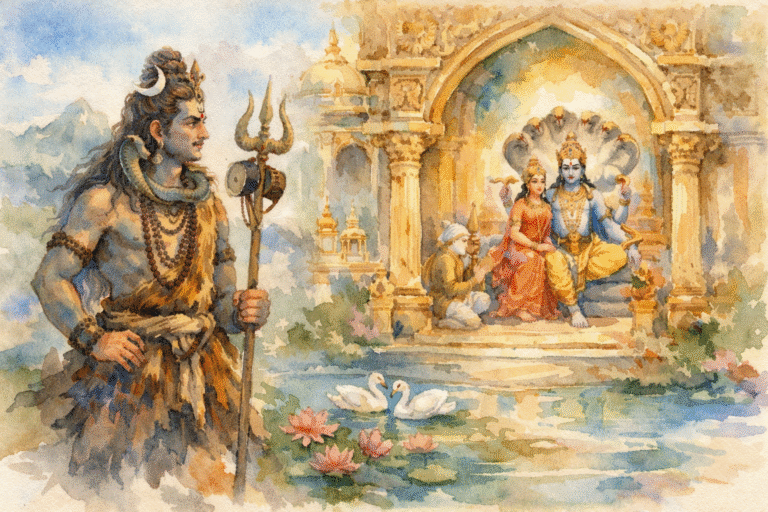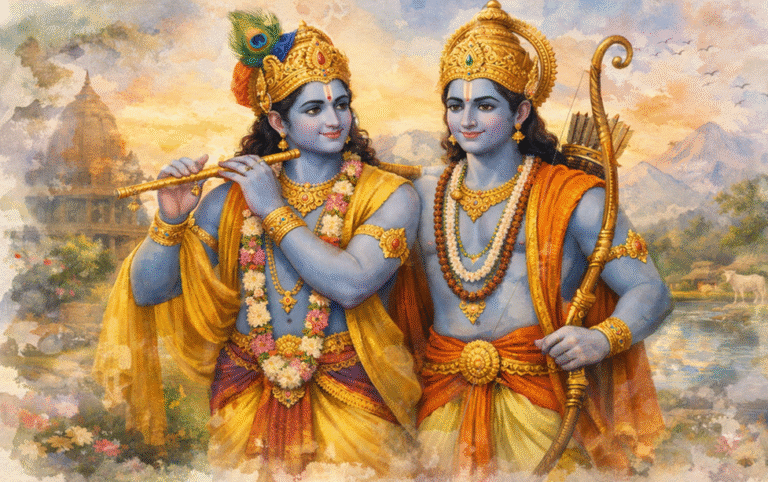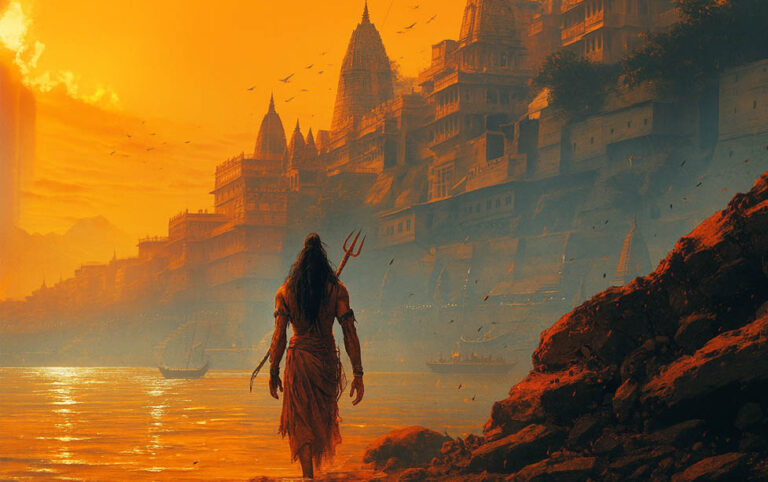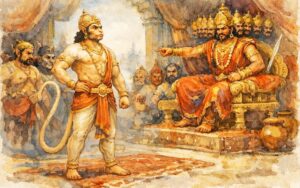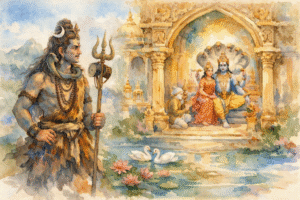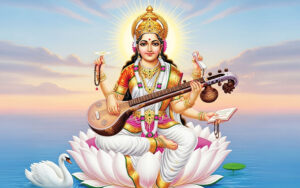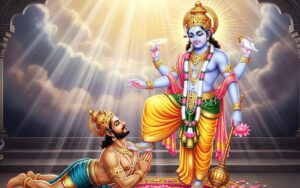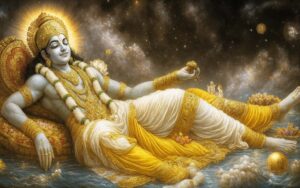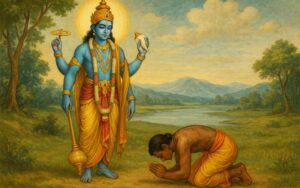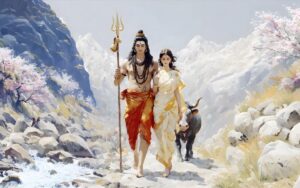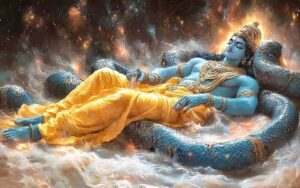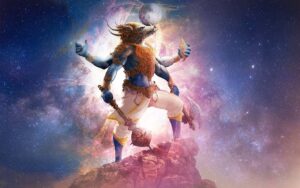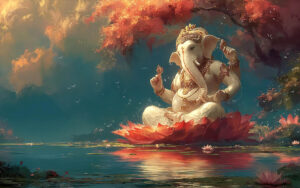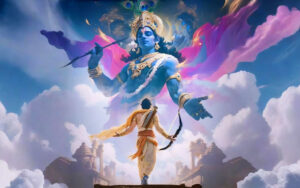
No time for reading the blog? Give it a listen on Spotify.

A few shocking moments—heartbreaking deaths, clever tricks, and fateful choices—changed the course and outcome of the Mahabharata war.
The Kurukshetra War, the cataclysmic clash at the heart of the Mahabharata, raged for eighteen brutal days, its outcome hanging perpetually in the balance. While vast armies clashed, the destiny of an empire was ultimately decided not solely by numbers, but by a handful of pivotal moments – shocking turns of fate, devastating losses, desperate gambits, and ethically fraught decisions. These critical junctures, like hinges of destiny, dramatically shifted the war’s momentum, shattering invincibility, igniting vengeful oaths, exploiting profound vulnerabilities, and ultimately sealing the fates of legendary warriors and the Kaurava cause itself.
From the fall of the unconquerable Bhishma to the tragic demise of Abhimanyu and the controversial ends of Drona, Karna, and Duryodhana, these moments stand as the defining catalysts that steered the greatest epic war towards its devastating, yet decisive, conclusion.
Day 10: The Fall of the Unconquerable (Bhishma’s Fall):
Context: For nine brutal days, Grandsire Bhishma, bound by his vow to protect Hastinapur’s throne (currently occupied by Duryodhana), decimated the Pandava armies. He seemed invincible, a one-man fortress. The Pandavas were demoralized and facing annihilation.
The Turning Point: Remembering Bhishma’s own secret vulnerability (he would never raise weapons against someone born a woman, Shikhandi), Krishna guided Arjuna. On the tenth day, Arjuna positioned Shikhandi as his shield and advanced. Bhishma, true to his oath, lowered his bow. From behind Shikhandi, Arjuna unleashed a torrent of arrows, pinning the mighty patriarch to the earth on a bed of shafts. Bhishma chose to wait for the auspicious moment of his death, but he was out of the war.
The Shift: The psychological and strategic blow to the Kaurava army was immense. Their greatest warrior, their moral compass, and their commander was felled. Pandava morale soared. The seemingly unstoppable Kaurava momentum was shattered. Command passed to Drona, changing the war’s dynamic entirely.
Day 13/14: The Heartbreak and the Oath (Abhimanyu’s Death & Jayadratha’s Slaying):
Context: Drona formed the near-impenetrable Chakravyuha battle formation. Only Arjuna and Krishna (away fighting another threat) knew how to break it fully. Young Abhimanyu, Arjuna’s son, knew how to enter but not exit.
The Turning Point: Driven by duty and courage, Abhimanyu breached the Chakravyuha. However, following warriors, including Jayadratha (using a boon to hold them back), trapped him inside. Ignoring the rules of war, Kaurava warriors, including Karna, Drona, and Duryodhana, ganged up on the isolated Abhimanyu, attacking him unfairly and ultimately killing him.
The Shift: Abhimanyu’s brutal murder sent shockwaves through the Pandava camp. Arjuna returned to find his beloved son slain. Consumed by inconsolable grief and rage, he swore a terrible oath: to kill Jayadratha before sunset the next day or immolate himself. This single-minded focus on vengeance became the sole objective of Day 14, forcing the entire Kaurava army to focus solely on protecting Jayadratha. Krishna used divine illusion to create a false sunset. As Jayadratha emerged in relief, Arjuna beheaded him with an arrow guided by Krishna’s wisdom. This victory, born of tragedy and Arjuna’s near-suicidal oath, shattered Kaurava morale and avenged Abhimanyu.
Day 15: The Lie that Toppled a Lion (Drona’s Fall):
Context: With Bhishma gone, Drona assumed command and proved devastatingly effective. He raged like a fire, slaughtering Pandava soldiers by the thousands, seemingly unstoppable in his quest to capture Yudhishthira.
The Turning Point: Knowing Drona’s one weakness was his love for his son Ashwatthama, and that only news of Ashwatthama’s death would break his spirit, Krishna devised a desperate plan. Bhima killed an elephant named Ashwatthama and loudly proclaimed its death. Drona, shaken, sought confirmation from Yudhishthira, the embodiment of truth. Yudhishthira, under immense pressure, spoke a half-truth: “Ashwatthama is dead… (muttering) …the elephant.” The crucial last words were drowned out by conch blasts (arranged by Krishna). Hearing the “truth” from Yudhishthira, Drona’s will to fight vanished. He laid down his weapons and entered a meditative trance.
The Shift: Seizing the moment, Dhrishtadyumna, born to kill Drona, beheaded the defenseless guru. The death of their brilliant commander and teacher plunged the Kauravas into despair and disarray. Their strategic core was gone. This ethically dubious act, while achieving its goal, cast a long shadow on the Pandava victory.
Day 16/17: The Fall of the Last Hope (Karna’s Death):
Context: Karna, the mighty but cursed warrior, finally entered the fray as commander after Drona’s death. He was the Kauravas’ last great hope against Arjuna. Their duel was the stuff of legend, a culmination of lifetimes of rivalry.
The Turning Point: The battle was fierce and evenly matched. Then, fate intervened cruelly. Karna’s chariot wheel sank into the soft earth, immobilizing him. As he struggled to free it, he begged Arjuna for a pause, invoking the rules of chivalry. Krishna, reminding Arjuna of Karna’s own transgressions (his role in Abhimanyu’s death, Draupadi’s humiliation, and the unfair attacks on Pandavas), urged Arjuna to strike. Arjuna hesitated but fired the fatal arrow (Anjalika), beheading Karna.
The Shift: Karna’s death was the death knell for Kaurava hopes. Their greatest warrior, the counter to Arjuna, the secret Pandava brother whose strength and loyalty had sustained Duryodhana, was gone. The Kaurava army’s spirit broke completely. Only a handful of heroes, including Duryodhana, remained standing.
Day 18: The Blow that Ended It All (Duryodhana’s Fall):
Context: With his army annihilated and allies dead, a broken Duryodhana was summoned by his mother, Gandhari. She instructed him to bathe in a lake and stand before her naked. Having removed her blindfold, her divine gaze would solidify his body, making him invulnerable. However, Krishna intervened, questioning how Duryodhana could appear naked before his mother. Thus, Duryodhana covered himself with a loincloth before presenting himself, leaving his groin and thighs vulnerable while the rest of his body became solid and impenetrable.
The Turning Point: Duryodhana, now strengthened by Gandhari’s blessing, challenged Bhima to a duel. Despite his grief and exhaustion, he fought with astonishing skill in a Gadayuddha (mace battle). The clash was fierce and evenly matched, frustrating Krishna. Though Gandhari’s divine power had hardened Duryodhana’s body, Krishna reminded Bhima of his oath—to break Duryodhana’s thigh (a vow taken after the dice-game insult)—and of Duryodhana’s own underhanded strikes. Seizing the moment, Bhima delivered a brutal, dishonorable blow to Duryodhana’s thigh, shattering it and felling the Kaurava prince.
The Shift: Duryodhana’s fall marked the absolute end of organized Kaurava resistance. The war was over. While Ashwatthama’s horrific night raid would follow, it was vengeance, not war. Duryodhana, the architect of the conflict, lay dying. His reign, his ambitions, and the Kaurava line’s claim to the throne were finished. The Pandavas had won, but at a horrific cost, and the means of victory left a bitter taste.
These moments, driven by divine intervention, cunning strategy, heartbreaking tragedy, profound oaths, and ethically questionable acts, were the hinges upon which the fate of the Kurukshetra War swung, ultimately leading to the triumph of the Pandavas amidst unparalleled destruction.


